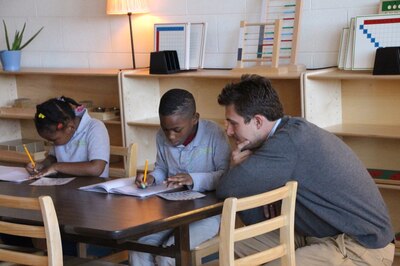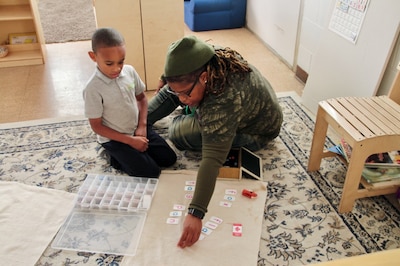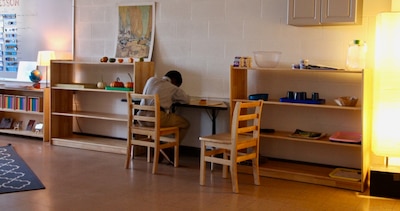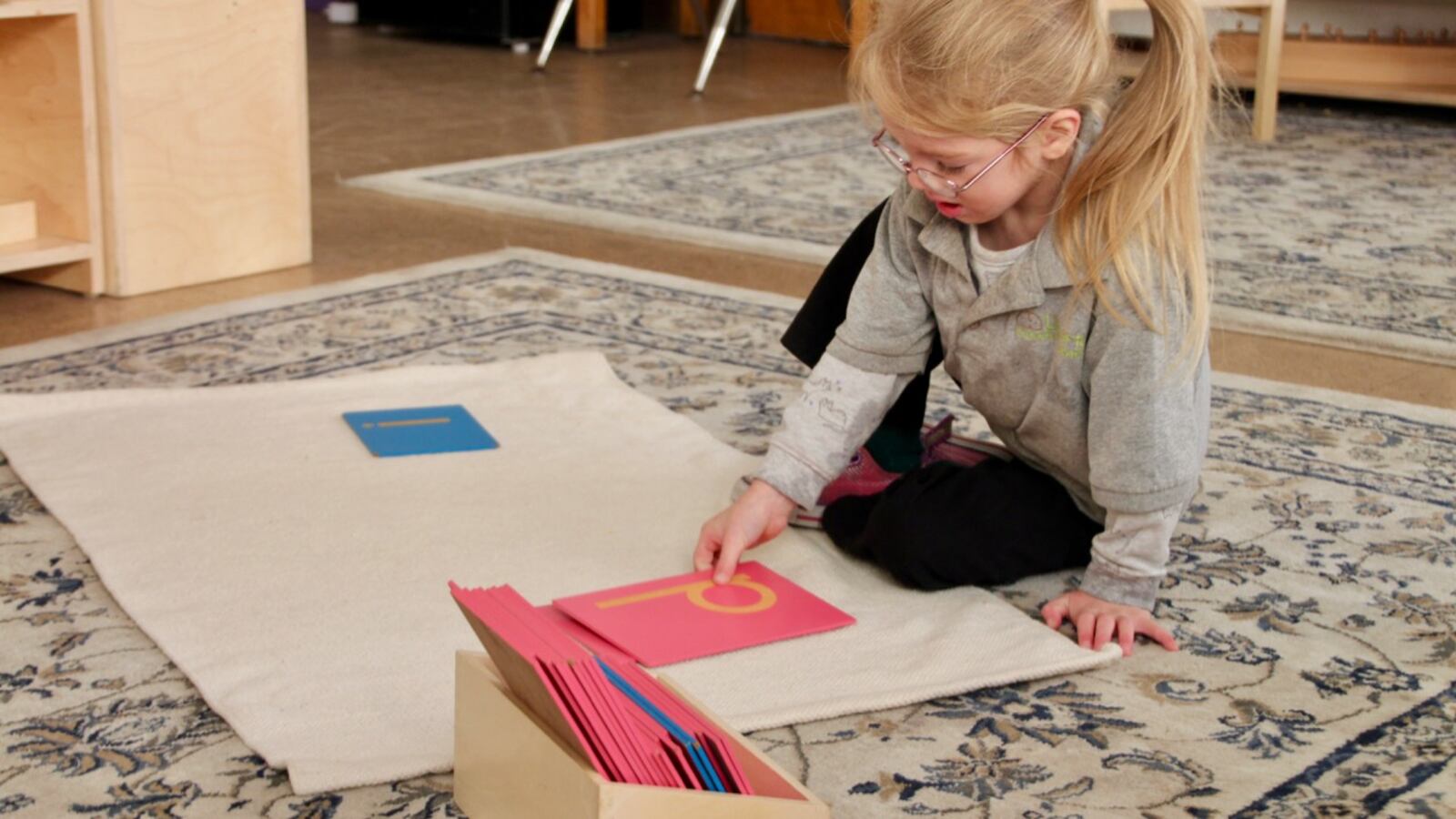Faith Dowell, a small kindergarten student for her age, pushes her round glasses further up her nose as she starts to trace lowercase letters in a sunlit Memphis classroom. She traces a lowercase “D” with her finger before sounding out the letter. “Deeeeeeee,” she says loudly.
What looks like a simple lesson would have been a monumental task for Faith a year ago when she started as a preschooler at Libertas School of Memphis, said father Jack Channing Dowell. Faith was born very premature and has developmental delays and trouble forming sounds that form words as a result.
“When we first came to this school, I was shocked at the diligence, how quiet the classrooms were,” Dowell said. “I thought, my daughter is going to destroy this place… But today, she’s grown so much in how to control her body, in how to pronounce words and letters.”
Libertas founder and leader Bob Nardo said students like Faith progress at his Montessori school because of supports in place totaling $500,000, some of which could be in jeopardy due to shifts in state funding. These supports include smaller classes, like Faith’s classroom – which has a ratio of three teachers to about 11 students – as well as two full-time speech therapists and part-time occupational and physical therapists.
Nardo’s school is one of 30 in the Achievement School District, a district of charter schools that took over historically low-performing schools. He is among charter leaders in the achievement district that fear further state cuts would seriously affect special education programs in the state’s district of students with some of the highest needs.

Many states struggle with how to create and provide adequate special education funding, leaving districts and individual schools with the task of trying to find alternative sources of money. Texas has recently drawn scrutiny for illegally pushing its districts to keep thousands of students out of special education, saving the state billions.
This school year the state halved a $10 million grant for low-performing schools. Charter operators, who voluntarily pooled their grant money to make paying for special education services more manageable, now fear they must discontinue the services or look for money elsewhere.
Nardo said Libertas still received a one-time $250,000 state grant this year, making it possible to continue providing some of the expensive services to his students with disabilities. But Nardo said the state doesn’t yet know if the grants will renew next year, meaning he could lose the funding.
State officials have said that the grant was never meant to be permanent, and Nardo called it a “Band-Aid solution” that doesn’t heal the more serious problem of inadequate funding for students with higher needs.
“We haven’t had any movement on the underlying issue, which is simply this: The state created a district constituted exclusively of high poverty schools, which have a tremendously high concentration of severe special needs,” Nardo said. “They did that for the purposes of school turnaround, which was the right thing to do. But the level of funding we need to do this work has not been there.”
About a quarter of the 364 students at Libertas have a disability. About 13 percent of students in the achievement district have disabilities, which is right at the state average for all Tennessee districts. Libertas, which has a larger number of programs and supports for disabled students, has been receiving a larger share of the pooled grant money.
Charter school leaders said that they are pushing Tennessee’s governor, Bill Lee, to explore student-based funding. Funding would be determined by each student’s needs, taking into account factors such as family income and student disabilities. Shelby County Schools recently adopted such a model, but Tennessee uses a funding formula that doesn’t weigh such outside factors. (The state’s two largest school districts are currently suing the state over claims of inadequate funding due to issues like poverty).
But Nardo acknowledged that a new funding model for the state would be a massive project and he called for state officials to more quickly address the funding gaps in special education for schools in the achievement district.
This comes at a time when the turnaround district’s future is murkier than ever. Under Commissioner Penny Schwinn, state officials just wrapped up a listening tour to get public input on the district’s future but have provided few specifics. Schwinn has said major reforms are needed for the district, which has struggled to boost students’ test scores.

Nardo said his school’s low teacher-to-student ratio and hands-on approach has allowed students with disabilities to increase their math and reading scores on national tests at a faster rate than Libertas students without disabilities. And his school was one of only five in the Achievement School District to score a level 5 on state exams, or in the top level of student growth.
“In the meantime, we’re committed to serving children in our community well, but it leaves a very gray area if we can’t sustain some of these programs, because we can’t send these children away,” Nardo said. “But it creates a bait-and-switch situation where we have had the funding for these robust programs, and if some of that funding goes away, where does that leave us in serving families well?”
Jamilyn Cole, a Libertas fourth- and fifth-grade special education teacher, said smaller classroom environments and the school’s contracts with Le Bonheur Children’s Hospital to provide therapists have resulted in improvements for students with disabilities.
“This is the first time as a teacher where I feel like kids are truly getting what they need, which is hard to say,” said Cole, who herself was once a special education student and has been a longtime Memphis teacher.
Roblin Webb, leader of charter organization Freedom Prep, serves a smaller special education population within the achievement district but agreed that state funding and the structure of the district don’t set schools up to serve well.
Webb said that because the achievement district is made up of separate charter operators, it is unable to cluster students with disabilities together like a traditional district does. For example, children who have motor skill delays might be grouped at one school.
“I can’t afford to serve one blind child, for example, and serve them well,” Webb said. “It would take my entire program to be able to do that…I know that no one has perfect funding to educate students, but special education needs and deserves so much more. It’s unfair to ask institutions to do it under our current system, because people will just do it poorly.”

Libertas parent Vinessa Brown knows both the benefits of the extra funding and the precariousness of that money. She is the charter school’s board chair, as well as a mother of two students – one of whom has autism.
“These are the kinds of changes and challenges we don’t want parents to see,” Brown told Dowel, Faith’s father. “We don’t want children to see these battles we have to fight for money behind the scenes. We want them to see that we care and that we promise they will get what they need.”
Dowell was surprised when Brown explained that some of the funding is insecure for the supports that they love. They talked about the academic and social growth they have seen in their children while at Libertas as a result of the funding.
“Used to be, he’d only be in the corners” of the classroom, Brown said of her son. “He needed to be away from everyone. Now, he works in the middle of everything, he wants to be around others. I want that for every kid like him who walks in the door next year. I want a system that makes paying for that possible.”


